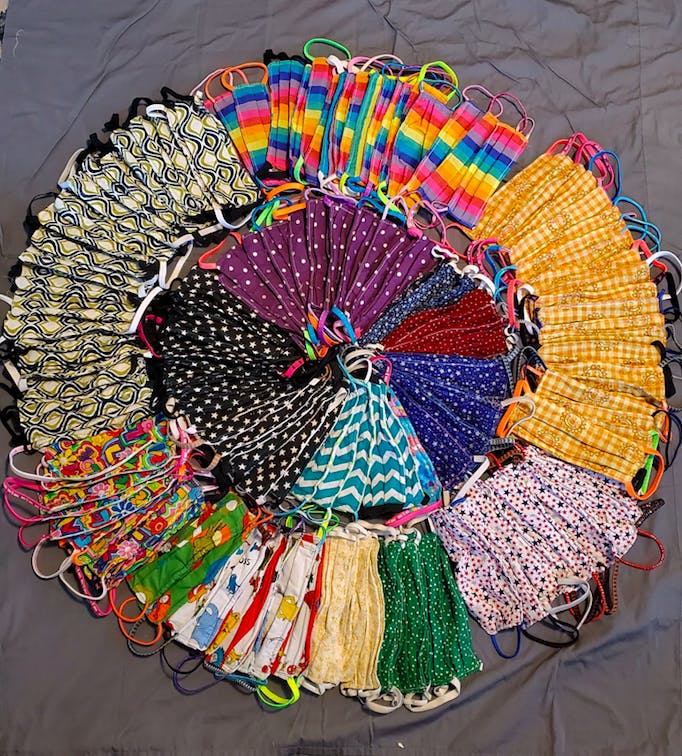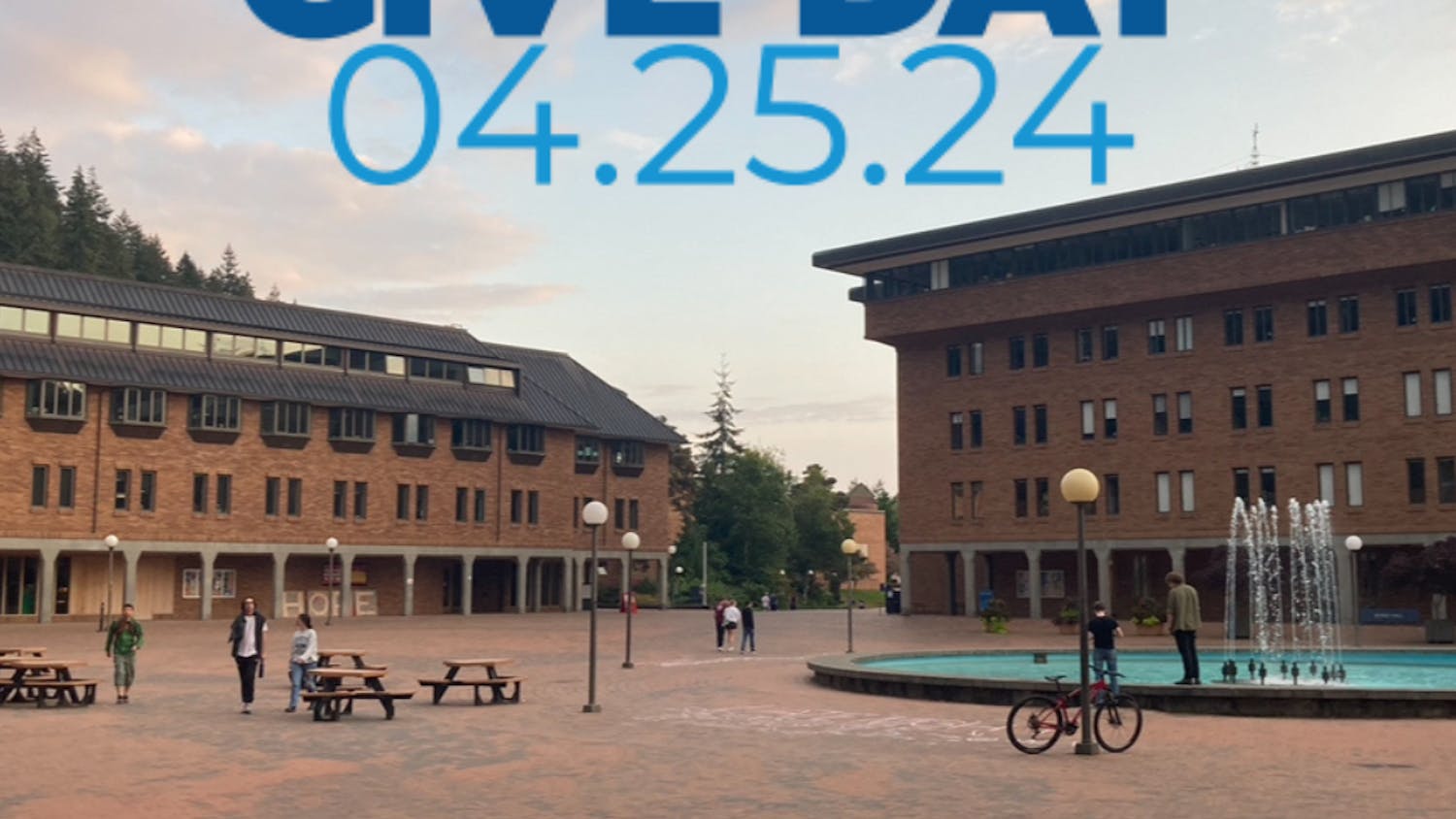
Local group organizes homemade mask donations to prevent spread, protect against COVID-19
Amidst a growing need for protective face coverings among essential workers, Whatcom County community members have stepped up to the plate, needle and thread in hand. Over the course of three weeks, thousands of masks have been cut, sewn, packaged and donated to the people that need them most.
The Centers for Disease Control and Prevention has recommended that all people wear face coverings in public when they make essential trips. Homemade cloth masks do not serve the same protective purpose as surgical masks or N-95 respirators, according to the CDC, but can play a critical role in preventing the spread of the coronavirus for people going out in public. If someone is unknowingly infected, a face covering stops the spread of droplets from the mouth or nose to other people, making it harder for the virus to spread.
After seeing requests for face masks in Spokane and Seattle, Jennifer Jones decided to start making homemade masks to donate to facilities in need. Jones told her friend, a nurse in the ICU at PeaceHealth’s St. Joseph Medical Center, that she was going to start sewing masks to donate to other hospitals. Her friend told her that they were in need in Bellingham and asked her to donate them locally instead. It was a realization, Jones said.
“That was the first time I realized what this was becoming. This wasn’t just a couple of hospitals needing a couple hundred masks. This was everywhere,” Jones said. “I started sewing. By that night, nurses were knocking at my door, seeking masks.”
According to Jones, essential businesses like hospitals, grocery stores, pharmacies, assisted living facilities and other services that remain open during the COVID-19 pandemic are in need of personal protective equipment, like masks. Store shortages have made it difficult to get them. There are many groups around the county, state and country that are working together to provide masks to those who need them, Jones said.
Jones decided to start a Facebook group called the Whatcom Mask Collective with her friend Kim Brunelle Kuehnel to gather community mask-making efforts together. They made the group on Saturday, March 21, and by the end of the first day, 250 people had joined. In three weeks, the group has grown to over 800 members.
At first, the group donated primarily to medical care facilities, like the hospital and nursing home facilities, Jones said. When the group created an outreach team, they started receiving donation requests from other industries, such as pharmacies and grocery stores. Masks have been donated to Walgreens, Grocery Outlet, the Opportunity Council and the Bellingham School District, among others.
According to Jones, there have been debates about the efficacy of homemade face masks. There are different styles and materials that provide a range of coverage and benefits. The group provides kits to make Deaconess-style masks, which cover the nose and mouth and are secured behind the ears, but any mask styles are encouraged.
The homemade masks are playing a valuable role at PeaceHealth St. Joseph in Bellingham, Michael Hampton, director of rehabilitation services, said. To prepare for any influx of COVID-19 patients, PeaceHealth is conserving surgical masks and using them only when necessary. Homemade masks cannot be used in patient care areas, but are being distributed in waiting rooms and common areas to patients and workers alike, Hampton said.
“Masks are a very critical component of our personal protective equipment toolbox. This is where the hand sewn masks become a very valuable tool to us,” Hampton said in an email. “Thanks to the overwhelming support of our community, we are receiving enough hand sewn masks to replace those given to visitors and to meet our caregiver’s needs.”
According to Hampton, on an average day, PeaceHealth St. Joseph is using between 200 and 250 homemade masks.
Jones’ biggest regret was not keeping track of the total number of masks made. She estimates that over 12,000 masks have been made and donated in the past three weeks, coming out to an average of almost 600 masks being made per day since the group began. A partnership with Bellingham Makerspace greatly helped the group by providing supplies and a location for pickup, Jones said.
Lindsay Knight, a local community member and a member of the Whatcom Mask Collective, has made over 500 masks.
“My entire family works in health care. My goal has been getting masks directly into the hands of health care workers,” Knight said. “When you see those health care workers wearing your masks and they’re just so thankful to the point of tears … it’s amazing.”
Knight recounted a story from her mother, a nurse manager in Bellingham. Knight made her 200 masks to bring to her team. The day before they were delivered, the team had had an exceptionally difficult day. When the masks were delivered, Knight’s mother said it gave a team that was close to the breaking point renewed hope and energy to continue the fight.
According to Knight, accessing supplies to make the masks and the debate about which masks are most effective have been challenging, but seeing the appreciation and gratitude from exhausted health care workers makes it worth it.
Another challenge has been keeping up with the demand, Jones said. When the movement started, her phone was going off constantly with requests and questions. Balancing the pressure she felt to make masks and her own health required lots of effort.
“We were not really sleeping,” Jones said. “Kim and I were working 12 to 14 hours a day, and overwhelming requests and information were coming in for just two people.”
Jones credits the success of the movement to her friendship and teamwork with Kuehnel. Without her support and help, the group could not have grown as large or as impactful as it is now, she said.
The donated masks aren’t just helping medical personnel and essential workers. Making masks is giving people something helpful to do, and during uncertain, scary times, that is incredibly valuable, Jones said.
“People are texting me saying, ‘Oh my gosh, thank you for giving me a purpose during this horrible, sad time,’” Jones said. “We want everybody to feel like they’re part of this effort and that’s the really rewarding side effect.”





